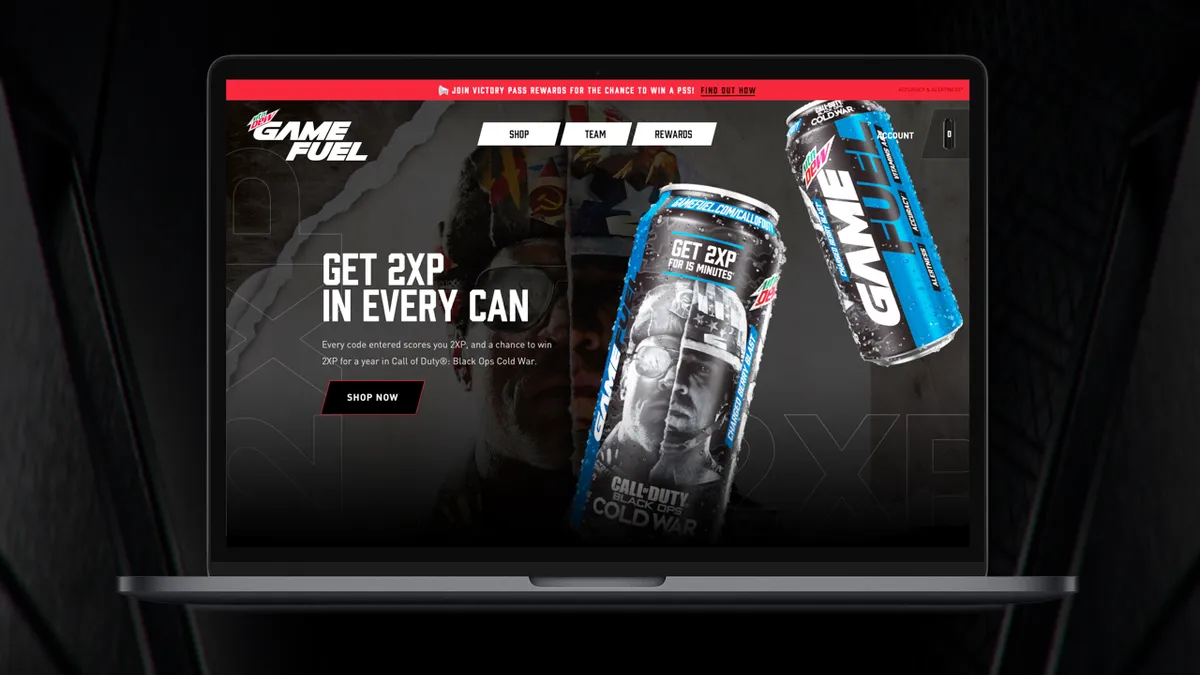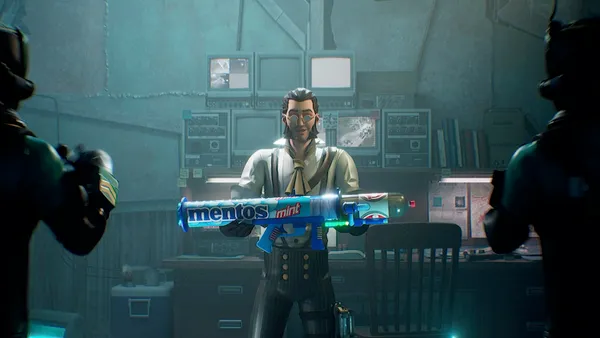Dive Brief:
- PepsiCo's Mtn Dew Game Fuel this month opened an online store for direct-to-consumer sales of its full line of soft drinks aimed at video game fans. To celebrate the launch, Mtn Dew is running a sweepstakes to give away a Sony PlayStation 5 gaming console and a copy of the game "Call of Duty: Black Ops Cold War," per an announcement.
- Mtn Dew fans who register by Jan. 31 at the GameFuel.com website to join the brand's new Victory Pass Rewards loyalty program will be entered for a chance to win the grand prize. Every time rewards members buy cases of Mtn Dew Game Fuel for free delivery, they can unlock exclusive digital content, discount codes and access to limited-edition merchandise.
- Billed as a "direct-to-gamer" offering, the website can help PepsiCo collect first-party data on younger consumers who are interested in gaming and esports. Starting today, Mtn Dew's first product offering includes a limited-edition collectible can inspired by video game celebrity Dr DisRespect with the purchase of any case of Game Fuel from the online store, while supplies last.
Dive Insight:
PepsiCo's rollout of an online store and loyalty program for Mtn Dew Game Fuel is part of the company's broader effort to develop direct-to-consumer (DTC) sales channels for its brands, while also tapping into the growing popularity of video games and esports.
Mtn Dew has cultivated its popularity among gamers since introducing Game Fuel in 2007, first as a limited-edition soft drink that has been expanded into multiple flavors and an energy drink called Mtn Dew Amp Game Fuel. By asking fans to register on its GameFuel.com site to place orders and earn rewards, the soft-drink brand can gather first-party data about consumers that help with future marketing efforts. Mtn Dew is offering additional incentives to join its Victory Pass Rewards program with the sweepstakes to give away gaming products such as the PlayStation 5, the new gaming platform that's difficult to find in stores because of shortages related to the pandemic.
By setting up an online store for Mtn Dew Game Fuel, PepsiCo is adopting a strategy developed by digitally native brands to sell their products directly to customers instead of through established supply chains. The strategy gives PepsiCo more control over the customer experience (CX) and helps to support more one-to-one relationships with the most loyal fans of Mtn Dew. Its Victory Pass Rewards program gamifies interactions with those consumers, giving them a chance to "level up" — in gamer parlance — by ordering more cases of Mtn Dew Game Fuel online. The development of a loyalty program for the soda comes a year after PepsiCo created its first cashback loyalty program called PepCoin to drive repeat purchases of its brands, which include Pepsi, Mtn Dew, Lipton bottled drinks, Aquafina, Lay's, Doritos, Cheetos, Ruffles, Fritos and SunChips.
The online store and loyalty program also help to collect first-party data about consumers, which has become a priority for brands whose media strategies are shifting to audience-based targeting. First-party data has become more valuable to marketers as technology companies respond to consumer concerns about privacy and stricter laws against data sharing. Google in January said it would end support for third-party cookies in its Chrome browser by early 2022 unless the media and marketing industries developed other tracking methods. Apple started blocking third-party cookies in its Safari browser by default this year, and later announced a plan that next year will require app developers to get opt-in consent from its customers to access the Identifier for Advertisers (IDFA), a randomized number Apple assigns to each of its devices. These moves will challenge marketers to develop sources of first-party data to improve their ad targeting.
Video games have entered the cultural mainstream, especially among younger consumers who have sought ways to keep themselves entertained while stuck at home. Brands including Mtn Dew are ramping up their marketing efforts to reach those consumers, whose time spent either playing video games or watching others play on livestreaming platforms like Twitch makes them harder to reach through other media channels. The enthusiasm for video games is seen in higher consumer spending on video game hardware, content and accessories, which rose 14% to $3.8 billion in October from a year earlier, lifting the 2020 total by 20% to $37.5 billion, per NPD Group research data cited by VentureBeat.














